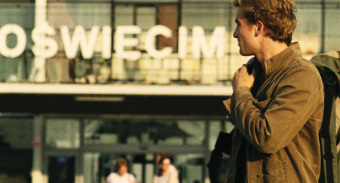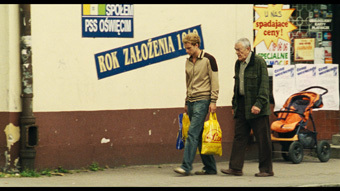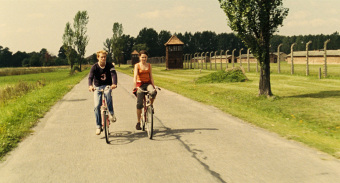The Film Am Ende kommen Touristen (And Along Come Tourists) (Germany, 2007, directed by Robert Thalheim)

© 23/5, ZDF

© 23/5, ZDF

© 23/5, ZDF
The 19-year-old German Sven Lehnert, instead of serving in the Bundeswehr, is doing his compulsory alternative service at the International Youth Meeting Center at Auschwitz, “because it didn’t work out with Amsterdam.” Unprepared and amazingly naive, he begins his stay abroad. His assignment is to look after the roughly 80-year-old Polish concentration camp survivor Stanisław Krzemiński, who was so traumatized by his stay in the camp that to this very day he continues to repair the deportees’ suitcases, which he promised to return. Krzemiński is not enthusiastic about the help at first; he treats the conscientious objector harshly and picks on him. Only gradually does Sven gain his trust. Through the Pole Ania Lanuszewska, who works as a guide at the memorial center, Sven acquires some perspective on present-day Oświęcim, the memorial site, the tourists, and the inhabitants’ economic problems and hopes in united Europe. On a bike tour through the area, Ania shows him, among other things, the grounds of the Buna/Monowitz concentration camp, the camp street, and the contemporary village of Monowice. At a commemorative event for German apprentices from the chemical industry, “Sven’s survivor” Krzemiński speaks at the monument in Monowitz. Sven energetically sides with him when the group leader tries to interrupt his talk. While Sven’s encounter with Ania and his debate over the budding relationship with her is depicted as genuine, the educational work at the memorial center and the committed teachers with their school classes are unsparingly held up to ridicule, as they seem to comply with every cliché of the “crunchy granola educator.”
In the entire film narrative, no mention of Jews is made at any time, and the Holocaust, too, is not addressed directly, but always sidestepped. In that respect, this movie is more a coming-of-age story than a film that seeks, from a present-day perspective, to address the crimes that occurred in Auschwitz. The meeting center becomes a “reconciliation simulator”[1] uniting (non-Jewish) Polish and German youths, who simply turn a blind eye to the extermination of the European Jews.
“But what holds true for contracts can also hold true for reconciliations between two parties, namely that they are to be viewed as immoral when they are arranged to the detriment of third parties. Presenting Auschwitz-Birkenau exclusively as the scene of Polish-German conflict in the past and a place of succeeding reconciliation in the present, and doing so at the authentic location besides, while paying no attention to the destruction of Europe’s Jews at the same place, is either narrow-minded or purely and simply a courtesy to preachy advocates of German-Polish reconciliation. That conclusion certainly is altered in no way by the camera shots of the names of Jews on some suitcases in the museum, as their visual significance in the film lies solely in describing Krzemiński’s persistent fixation on Auschwitz-Birkenau. Thalheim could have saved himself, and us, a few simplifications and presented Auschwitz-Birkenau as a place where many things are possible, anything but reconciliation. A film that is set in present-day Auschwitz/Oświęcim but in which the Holocaust does not appear, or appears at most as a gap, is German-Polish reconciliation kitsch.”[2]
(SD; transl. KL)
















